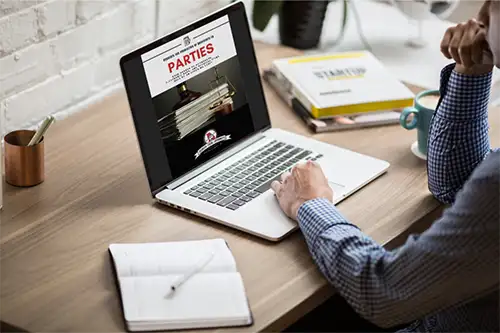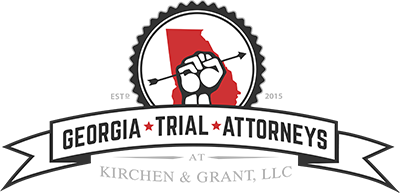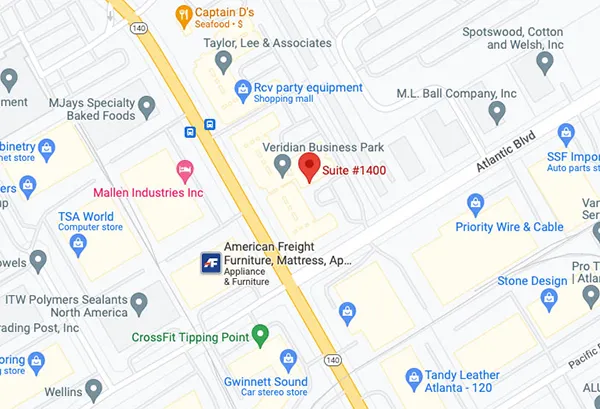Your Information
MASTER THE ART OF requesting documents :
A Comprehensive Guide for Personal Injury Law Firms!
Unlock Hidden Value In Your Personal Injury Cases With Expert Strategies For Document Requests From Georgia Trial Attorneys.
Requests for Production of Documents are fundamental to discovering tangible evidence that will assist in determining the facts, advancing legal theories and ultimately protecting your client. To aid in this effort, we've put together a free, downloadable template for Requests for Production of Documents to a Defendant in a personal injury lawsuit. Per O.C.G.A. §9-11-34, a party may request another party to produce certain documentation or make such documentation available for inspection. This applies to documentation that is stored both physically and electronically.

How Do Requests For Production Advance A Personal Injury Case?
Requests for Production of Documents (RPDs) are pivotal in the Discovery process of a personal injury lawsuit. These requests, tailored to the specifics of each case, aim to secure tangible documents or objects that one party believes are in the other party's possession. The item being requested can vary widely - it may be a physical document, a helmet worn during an accident, a bicycle involved in the incident, clothing worn at the time, or any other physical item that can be argued as being relevant to proving a claim in the dispute.
Requests for the production of documents can be classified into five distinct categories:
- Legal & Case Related Documents: these documents serve as the foundation for the arguments and positions taken by both parties. Documents here include defenses, exhibits, statements, and any that are identified in responses to interrogatories or received through non-party requests or subpoenas. These documents provide a comprehensive view of the case's legal framework.
- Correspondence & Communication: this could include communication between the parties, their representatives and other relevant entities. It could also include correspondence from employers, medical providers, social media postings, witnesses, etc. These documents can provide important context and can also reveal crucial details about the case, including the behavior, motives, and strategies of the parties involved.
- Personal Documents & Information: this category includes personal information that can shed light on the background and character of the parties involved. Such documents may include cell phone records, driver's licenses, military records, and evidence of ownership. This information can help paint a picture of an individual's life, habits, and circumstances, which can be pertinent to the case.
- Business & Employment Records: These documents pertain to the professional and business-related aspects of the case. They may include drive schedules, regular business files, and reservations. These records can reveal important information about the business practices, professional responsibilities, and work-related activities of the parties involved.
- Incident Specific Documents & Evidence: This category includes documents and physical evidence directly related to the incident in question. These may include graphics such as photographs or videos, insurance records, maintenance records, property damage reports, and other documents specific to the incident, such as those concerning the scene of the car crash or the vehicles involved. This evidence can be crucial in establishing the events, conditions, and consequences of the incident.
PREVIEW:
IN THE STATE COURT OF HALL COUNTY STATE OF GEORGIA
JOHN SMITH,
PLAINTIFF,
v.
ROBERT SMITH,
DEFENDANT.
CIVIL ACTION
FILE NO.:
PLAINTIFF’S FIRST REQUEST FOR DOCUMENTS TO DEFENDANT ROBERT SMITH
TO: Robert Smith, Defendant.
FROM: John Smith
You are requested to file within thirty (30) days a written response to these requests and to produce those documents for inspection and copying at the offices of Georgia Trial Attorneys at Kirchen & Grant, LLC, 6825 Jimmy Carter Boulevard Ste 1400, Norcross, GA, 30071-1266, or provide a color PDF copy in lieu of inspection and copying.
INSTRUCTIONS
1. Production of documents responsive to these requests should be produced in digital format. The documents may be sent via email to the Electronic Service Email: [email protected]. Plaintiff can also provide a secure portal to upload any responsive documents or Plaintiff will gladly provide a CD or USB stick in which to transfer responsive documents to require minimal time and cost to produce.
2. These requests shall encompass all items within your possession, custody, or control which also includes documents in possession, custody, or control of your agents, agents directing this defense on your behalf, representatives, investigators, adjusters, and attorneys, unless privileged. For all information withheld subject to a bona fide claim of privilege, a privilege log is required to be produced in accordance with Rule 5.5.
3. These requests are continuing in character as to require you to file supplementary answers if you obtain further or different information when such information becomes known or identified. O.C.G.A. § 9-11-26(e).
4. Unless otherwise stated, these requests refer to the time, place, and circumstances of the occurrence mentioned or complained of in the Complaint. The terms “car crash” refers to the same.
5. If in responding to these requests you encounter any ambiguity in construing any request, instruction, or definition, set forth the matter deemed ambiguous in the construction used, in responding.
6. Boilerplate and general objections to discovery is strongly discouraged by the Court. You must expressly make an objection and describe the thing not produced and reason the information was withheld.
7. As per the Georgia Civil Practice rules, the documents shall be produced as they are covered in the usual course of business, or you shall organize and label them to correspond with the categories in the request.
DEFINITIONS
As used in these requests, the following terms are to be interpreted under these definitions:
1. The term "person" includes any individual, joint-stock company, unincorporated association or society, municipal or other corporation, state, which agencies or political subdivisions, and court, or any other governmental entity.
2. The terms "you" or "your" include the persons to whom these requests are addressed, and all that person's agents, representatives, or attorneys.
3. In accordance with O.C.G.A. §9-11-34(a), the terms, "document" or "documents" includes all “writings, drawings, graphs, charts, photographs, phono-records, and other data compilations from which information can be obtained, translated, if necessary, by the respondent through detection devices into reasonably usable form” which constitute or contain matters within the scope of discoverable material and which are in the possession, constructive possession, custody, or control of your, your employer, attorneys, or agents acting on your behalf.
4. If any document was, but is no longer, in this Defendant possession or subject to this Defendant control or was known to this Defendant, but is no longer in existence, provide a detailed description of the document’s current existing state to include the location of the document or indicate if it is missing, lost, destroyed, voluntarily or involuntarily transferred to others, or otherwise disposed of.
5. The term “car crash” is defined as the incident complained in the Plaintiff’s complaint, specifically the collision involving the parties on Saturday, June 5, 2021.
DOCUMENTS TO BE PRODUCED
1. Admissions Denials. Copies of all documents relied upon to demonstrate or support this Defendant’s denial of any of Plaintiff’s First Request to Admit to this Defendant.
2. Cell Phone. Copies of cell phone records showing incoming and outgoing calls, texts, and messages for the date of the incident complained of in the complaint.
3. Defenses. A copy of all documents relied upon to demonstrate or support this Defendant’s defenses and affirmative defenses in the Answer.
4. Drive Schedule. Any invoices, logs, sales receipts, itineraries, or schedules for Defendant if Defendant was driving and operating equipment in the scope of their employment.
5. Driver’s License. Your current driver's license, and if different, this Defendant's driver's license in force at the time of the subject accident.
6. Employer Correspondence. All correspondence not previously provided above, between representatives of this Defendant and any of Plaintiff’s employers.
7. Exhibits. All documents, statements, videos, photos, printouts that may be used as an exhibit at any trial or mediation in this matter not otherwise disclosed above.
8. Graphics. All photographs, videotapes or audiotapes, x-rays, diagrams, medical records, surveys, or other graphic representations of information concerning:
9. Identified Documents. All documents identified in your answers to any Interrogatories.
10. Insurance. All policy documents for any insurance carrier or...
Need Support Or Have Questions?
We invite you to explore our other free resources and learn more about the art of drafting effective pleadings and letters. We firmly believe in the power of knowledge and the importance of sharing that knowledge with our peers.
If you have any questions, need additional resources, or require assistance with a case, don't hesitate to contact our team of skilled personal injury attorneys. Together, we can raise the bar in personal injury litigation and ensure justice is achieved in every case.


